Brakes are the heart of your vehicle and if you can’t pump the brakes then it means that you need to stop your car immediately on the side of the road and wait for emergency roadside assistance.
The brake pedal often gets stiff while driving and it sometimes feels like you have to practically stand on the pedal to slow down your vehicle, this is a very common yet horrifying situation. Since it becomes harder to slow down your vehicle, therefore a stiff brake pedal is a serious safety concern that should be fixed right away.
If you ever feel like your vehicle’s brakes are becoming stiff, immediately stop your car on the side of the road and call a certified towing company for help.
How Do Brakes Work?
Mostly stiff brake pedals are caused due to some problem with the brake booster. The brake boosters are used to multiply the force applied to your brake pedal and work in tandem with the hydraulic fluids that run in the brake lines. This brake booster system is also known as power brakes and it allows you to stop a two-ton vehicle with just a slight push.
The common brake boosters, located between the brake pedal and the master cylinder, have two chambers that are separated by a diaphragm within them. The front chamber is used to remove air to create a low-pressure vacuum whereas the back chamber is used to let the air in.
Now that you have a better understanding of how the brake system works it may be easier for you to detect a stiff brake pedal.
Here are the common reasons why sometimes your brake pedal is hard to press:
Bad Brake Booster
A faulty or bad brake booster is one that can no longer maintain vacuum pressure. The vacuum assists your power brakes function because of the engine vacuum.
The brake booster is directly connected to the engine’s intake manifold via a vacuum hose that starts the process of drawing air into the engine that ultimately helps to draw the air from the front chamber of the brake booster.
Occasionally, due to a tear in the diaphragm or fault in the check valve, the brake booster stops creating a vacuum and ultimately fails to supply power to the master cylinder.
Here are a few steps that will help you to detect if your brake booster is the source of your still brake pedal:
- Firstly, turn off your car, and simply pump the brake pedal a few times until it becomes increasingly difficult to press down on the brake.
- Then with your foot still on the brake pedal, start your car.
- If the brake pedal sinks down before becoming firm then your brake booster is not the problem but if the pedal remains firm then you have a bad brake booster.
Failing Vacuum Pump
There are some vehicles that have a different type of brake booster. In such vehicles, the brake booster can be an electrical or mechanical driven pump that creates a vacuum on its own instead of the ordinary pump using the engine intake manifold to create a vacuum.
Also, there are some vehicles that have hydraulic brake boosters. These hydraulic pumps use the direct hydraulic pressure generated by the power steering pump instead of the engine vacuum pump.
So if you have a stiff brake pedal and your vehicle has a hydraulic pump or vacuum pump then some common causes of a stiff brake can be a failing electrical pump, low power steering fluid or a missing serpentine belt.
Final Word
In case your vehicle’s brake pedals get stiff in the middle of the road, stop your car on the side of the road and call a certified towing company and get immediate professional roadside assistance from professionals.
Need A Tow?
Are you looking roadside assistance for your car or motorcycle? Broken down vehicle, flat tire, car lockout, or dead battery? Our 24/7 light-duty towing services are just a phone call away!
Your Local Tow Truck Service in Melbourne Northern Suburbs.
Coburg Towing Melbourne located near Attwood. Please check below map.


Recent Comments